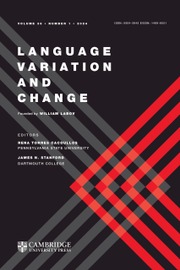Article contents
Genre effects on subject expression in Spanish: Priming in narrative and conversation
Published online by Cambridge University Press: 25 April 2007
Abstract
Structural priming refers to the process whereby the use of a syntactic structure in an utterance functions as a prime on a subsequent utterance, such that that same structure is repeated. This article investigates this phenomenon from the perspective of first-person singular subject expression in Spanish. Two dialects and two genres of spoken Spanish are studied: New Mexican narratives and Colombian Spanish conversation. An analysis of 2,000 verbs occurring with first-person singular subjects reveals that subject expression undergoes a priming effect in both data sets, but that the effect is more short-lived in the Colombian data. This is found to be attributable to the interactional nature of these data, showing that the need to deal with interactional concerns weakens the priming effect. As the first study to compare priming of subject expression across distinct genres, this article makes an important contribution to our understanding of this effect, and in particular, of factors that play a role in its maintenance or dissipation in discourse.I would like to thank Rena Torres Cacoullos for her many invaluable comments on this article and Jill Morford and Benedikt Szmrecsanyi for helpful discussion on the notion of priming. I also gratefully acknowledge Jessi Aaron and Matt Alba for help with the coding and analysis; Neddy Vigil and Garland Bills for making the New Mexican data available to me; Ana Aurora Medina Murillo for help with the transcription of the NM data; and María Elena Rendón, Marianne Dieck, and Rocío Amézquita for the collection and transcription of the Colombian data.
Information
- Type
- Research Article
- Information
- Copyright
- © 2007 Cambridge University Press
References
REFERENCES
- 118
- Cited by

